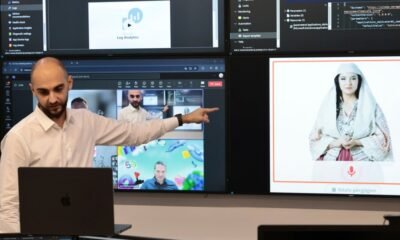Education
High school principal worries new curriculum may privatise education system
Education Minister Erica Stanford
Photo: RNZ / Samuel Rillstone
The government has announced a number of new secondary school subjects and a new emphaisis on artificial intelligence it says will help prepare young people for the jobs of the future.
But one high school principal says the changes means “we could be looking at privatisation”.
Albany Senior High School principal Claire Amos told Checkpoint the changes were a bit of a “mixed bag”.
“I like the breath of the list of subjects, I’ve still got a whole lot of questions around the details of what the subjects entail.
“I’ve got heaps of questions around what the actual curriculum of each of these subjects will actually look like,” she said.
Amos said she was worried that the subject list had only just been released.
She said she did not have any information on course content of those subjects.
Albany Senior High School principal Claire Amos.
Photo: Supplied
There were some “beautiful” subjects, she said, but added she was also concerned the subjects on the list were “narrowed” and “standardised”.
“I’m worried that we are moving towards a prescribed syllabus.
“It bothers me that I think one of the real strengths of our curriculum is aspects of flexibility, and that it can be localised and personalised.
“I recognise that people are concerned about excess flexibility, but i’m a huge believer in the power of NCEA… and think we should be looking at dealing with the problems and issues in NCEA, and solving that and refining it rather than throwing the baby out of the bath water and doing something completely different.”
She said finding teachers for many of the subjects would be a problem.
“We could be looking at privatisation by stealth…
“I would hate to think we are actually disempowering our schools to be teaching our learners,” Amos said.
“My worry is that there have been plenty of signals that actually the whole teaching of these programmes may be farmed out to external providers and that’s really problematic.”
Labour’s education spokesperson Willow-Jean Prime told RNZ the changes had come “really late in the piece” and were a surprise to many in the sector she had spoken to.
“They have been waiting for this list, asking for the list, they haven’t been involved in the development of this list and it has just been dropped and announced and now everybody is trying to figure out exactly what that means for them.”
Consultation on replacing NCEA with a new qualification began last month and ends on 15 September.
Labour’s education spokesperson Willow-Jean Prime
Photo: RNZ
Prime said that meant the sector only had a few days left to give feedback.
“This is the entire scrapping of the qualification framework that we have known for the last few decades and [it’s] being replaced with something entirely new.”
“It was not co-designed with the sector and six short weeks for the sector to provide their feedback is just too short,” she said.
Education Minister Erica Stanford said the announcement of new subjects and the end of the NCEA consultation were not “particularly related”.
“We’re just talking about a very broad high level direction of travel with NCEA… we can make those decisions without knowing the subject lists – they are out now – but there will be many more chances for a lot more decisions along the way around NCEA.
“The broad framework and the subjects are not related. You have to have a curriculum before you have what is being assessed, that is still the case. We will have a curriculum, then we will start to talk about what we assess, and how we assess it,” she said.
Earlier in the day, Stanford said those working on the currriculum changes were investigating having a new Year 13 subject on Generative AI “for later development”.
“With the rapid development of AI, students will also be able to learn about and use generative AI in a range of subjects. This may include learning about how digital systems work, machine learning, cybersecurity, and digital ethics.”
Stanford said the new subjects, being developed for the Years 11 to 13 curriculum, reflect the growing importance of science, technology, engineering and mathematics, often referred to as STEM.
She said the government was introducing new industry-led subjects to give students more choice.
These would include, primary industry, health and wellbeing services, outdoor education, automotive engineering, building and construction, infrastructure engineering, mechanical engineering, tourism and hospitality.
“Students will be able to specialise in areas such as earth and space science, statistics and data science, and electronics and mechatronics. There will also be a range of new specialist maths subjects including further maths.
“When our young people leave school, we want doors to open for them whether they’re going to tertiary study, learning a trade, or heading straight into work. These refreshed subjects will provide students with choice, purposeful pathways and opportunities for specialisation that set them up for success,” Stanford said in a statement.
It was vital students had access to “innovative and dynamic subjects” that would help the country’s future, she said.
Other new subjects include: civics, politics and philosophy, Pacific studies, Te Mātai i te Ao Māori and music technology.
Te Marautanga o Aotearoa will be resourced with a first ever detailed curriculum in te reo Māori as well as new subjects including new Tātai Arorangi (Māori traditional systems of Earth and Sky), Te Ao Whakairo (Māori carving) and Te Ao Māori subjects.
Phase-in over three years
The new subjects would be phased in starting with Year 11 students in 2028, then Year 12 students in 2029 and finally Year 13 students in 2030.
That gave the government just a few years to tackle a staffing shortage that principals have described as a crisis.
Stanford was adamant it could be done.
“Of course it is [possible], and I wouldn’t describe it as a crisis at all.” she said.
“We’ve got more students in training [to become teachers] than we’ve had in a very long time. A 28 percent increase in students studying secondary school teacher training.”
Chris Abercrombie
Photo: Supplied
Stanford explained that not all of the subjects would be covered at every school.
“As it exists now, not all schools do every subject,” she said. “They pick the subjects they’re able to offer, and that won’t change.”
But she noted that existing teachers might need to run additional classes.
“Many of these subjects will be taught by teachers already in the system,” she said.
“For example, there’s a new ‘journalism, media and communications’ subject. The teachers who already exist who teach media studies will likely teach that subject.”
Stanford hoped that the increased workload would be balanced by a flow of new teachers.
“It’s a bit of both. They may be doing additional subjects, or we may be having new teachers into the sector. It’s that combination of both, but we’ve got a long runway to get there.”
Post Primary Teachers Association president Chris Abercrombie said the government’s decision to release the list of secondary school subjects before the rest of the curriculum was putting the cart before the horse.
“It means that we have no idea, for example, of the prior learning that these Year 11 to 13 subjects will build on,” he said.
“We also would like to know what kind of support will be provided for the implementation of the new subjects in particular. We know from much experience that major changes succeed or fail depending on how well-resourced and supported the implementation of them is.”
Industry Skills Boards to develop the subjects
The Education Ministry would commission Industry Skills Boards to develop the subjects.
“These pathways will be industry led and tertiary aligned so they meet what is expected in the professional world, making staying at school relevant for every child, no matter what their career pathway. This will enable students to leave school with a secondary and a tertiary qualification. We’re having one integrated system where all subjects, whether ministry-led or industry-led, are equal,” Stanford said.
The peak bodies for teachers of both outdoor education and tourism courses previously told RNZ they feared the government’s overhaul of secondary school qualifications would downgrade them.
Education Outdoors NZ chief executive Fiona McDonald said the Industry Skills Board responsible for outdoor education had yet to be set up and would be poorly positioned to develop a school curriculum for outdoor education.
Sign up for Ngā Pitopito Kōrero, a daily newsletter curated by our editors and delivered straight to your inbox every weekday.
Education
FIORENTINO: STATE SYSTEM WILL TACKLE AI EDUCATION

In his new blog, State System of Higher Education Chancellor Christopher Fiorentino highlights an agreement signed with Google last week “to help students develop the AI competencies they will need in their future careers.” Writing that the State System can’t fool itself into thinking artificial intelligence is a “trend” or a “passing fancy,” Fiorentino pledges to enter the future with “eyes wide open.” He says perhaps the best contribution the state-owned universities can make is to ensure graduates know “what AI tools they should be prepared to use” as they start their careers.
The agreement to expand the State System’s partnership with Google includes IUP, Cheyney, East Stroudsburg, PennWest, and Millersville..
THE CHANCELLOR’S BLOG:
https://chancellorfiorentino.blogspot.com/2025/09/ai-is-not-fad.html
.
Education
AI in healthcare education: The future of learning explained

Artificial Intelligence (AI) is no longer just a tool for diagnostics; it is transforming the way healthcare professionals learn, train, and prepare for real-world practice. From medical students to practicing clinicians, AI-powered platforms are redefining education with immersive simulations, adaptive learning, and real-time feedback. Industry leaders weigh in on how AI is shaping the future of medical training.
AI AS A PERSONALISED LEARNING COMPANION
According to Ankit Modi, Founding Member & Chief Product Officer at Qure.ai,
“Artificial Intelligence is redefining healthcare education by enabling immersive, data-driven, and personalised learning experiences. AI-powered tools like virtual simulations, adaptive learning platforms, and predictive analytics are bridging the gap between theoretical knowledge and real-world clinical skills.”
He highlights that AI allows students to practice procedures in safe, simulated environments while improving decision-making and knowledge retention.
MAKING CLINICAL TRAINING IMMERSIVE AND ACCESSIBLE
Mr. Tejasvi Rao Veerapalli, CEO of Apollo Hospitals, Hyderabad, stresses the role of AI in scaling high-quality training:
“AI is revolutionising healthcare education by making clinical training more immersive, personalised, and efficient. Through intelligent simulation tools, real-time feedback, and adaptive learning platforms, students and professionals can now build skills in risk-free environments that mirror real-world scenarios.”
He adds that AI ensures deeper knowledge retention and bridges gaps in training access and expertise.
AI AS A MENTOR FOR FUTURE CLINICIANS
For Jeevan Kasara, Director & CEO of Steris Healthcare, AI is evolving beyond diagnostics to act as a learning mentor:
“Artificial Intelligence is revolutionising healthcare education, evolving from a diagnostic aid to a personalised mentor for future clinicians. Virtual patients strengthen diagnostic reasoning, adaptive assessment tailors learning to individual needs, and natural language tools make information instantly accessible.”
He emphasises that this transformation equips professionals with sharper skills, long-term retention, and empathetic patient care.
MOVING BEYOND TEXTBOOKS TO DYNAMIC LEARNING
Rustom Lawyer, Co-Founder and CEO of Augnito, sees AI as a bridge between static theory and interactive practice:
“Artificial Intelligence is ushering in a new era for healthcare education, firmly bridging the gap between theory and practice. By offering realistic simulations, personalised learning experiences, and real-time feedback, these technologies empower students and professionals to develop skills with greater confidence and accuracy.”
He notes that this shift accelerates training while making knowledge retention stronger and more practical.
THE FUTURE OF MEDICAL EDUCATION WITH AI
Across perspectives, one theme stands out: AI is not just a technological upgrade, but a pedagogical revolution. It makes education:
-
More immersive through simulations.
-
More personalised with adaptive learning.
-
More impactful with real-time feedback and recall.
By tailoring education to individual needs while keeping pace with advancing medicine, AI ensures the next generation of healthcare professionals are better equipped, more confident, and more empathetic from day one.
– Ends
Education
How to use ChatGPT at university without cheating: ‘Now it’s more like a study partner’ | University guide

For many students, ChatGPT has become as standard a tool as a notebook or a calculator.
Whether it’s tidying up grammar, organising revision notes, or generating flashcards, AI is fast becoming a go-to companion in university life. But as campuses scramble to keep pace with the technology, a line is being quietly drawn. Using it to understand? Fine. Using it to write your assignments? Not allowed.
According to a recent report from the Higher Education Policy Institute, almost 92% of students are now using generative AI in some form, a jump from 66% the previous year.
“Honestly, everyone is using it,” says Magan Chin, a master’s student in technology policy at Cambridge, who shares her favourite AI study hacks on TikTok, where tips range from chat-based study sessions to clever note-sifting prompts.
“It’s evolved. At first, people saw ChatGPT as cheating and [thought] that it was damaging our critical thinking skills. But now, it’s more like a study partner and a conversational tool to help us improve.”
It has even picked up a nickname: “People just call it ‘Chat’,” she says.
Used wisely, it can be a powerful self-study tool. Chin recommends giving it class notes and asking it to generate practice exam questions.
“You can have a verbal conversation like you would with a professor and you can interact with it,” she points out, adding that it can also make diagrams and summarise difficult topics.
Jayna Devani, the international education lead at ChatGPT’s US-based developer, OpenAI, recommends this kind of interaction. “You can upload course slides and ask for multiple-choice questions,” she says. “It helps you break down complex tasks into key steps and clarify concepts.”
Still, there is a risk of overreliance. Chin and her peers practise what they call the “pushback method”.
“When ChatGPT gives you an answer, think about what someone else might say in response,” she says. “Use it as an alternative perspective, but remember it’s just one voice among many.” She recommends asking how others might approach this differently.
That kind of positive use is often welcomed by universities. But academic communities are grappling with the issue of AI misuse and many lecturers have expressed grave concerns about the impact on the university experience.
Graham Wynn, pro-vice-chancellor for education at Northumbria University, says using it to support and structure assessments is permitted, but students should not rely on the knowledge and content of AI. “Students can quickly find themselves running into trouble with hallucinations, made-up references and fictitious content.”
Northumbria, like many universities, has AI detectors in place and can flag submissions where there is potential overreliance. At University of the Arts London (UAL) students are required to keep a log of their AI use to situate it in their individual creative process.
As with most emerging technologies, things are moving quickly. The AI tools students are using today are already common in the workplaces they will be entering tomorrow. But university is not just about the result, it is about the process and the message from educators is clear: let AI assist your learning, not replace it.
“AI literacy is a core skill for students,” says a UAL spokesperson, before adding: “Approach it with both curiosity and awareness.”
-

 Business2 weeks ago
Business2 weeks agoThe Guardian view on Trump and the Fed: independence is no substitute for accountability | Editorial
-
Tools & Platforms1 month ago
Building Trust in Military AI Starts with Opening the Black Box – War on the Rocks
-

 Ethics & Policy2 months ago
Ethics & Policy2 months agoSDAIA Supports Saudi Arabia’s Leadership in Shaping Global AI Ethics, Policy, and Research – وكالة الأنباء السعودية
-

 Events & Conferences4 months ago
Events & Conferences4 months agoJourney to 1000 models: Scaling Instagram’s recommendation system
-

 Jobs & Careers3 months ago
Jobs & Careers3 months agoMumbai-based Perplexity Alternative Has 60k+ Users Without Funding
-

 Podcasts & Talks2 months ago
Podcasts & Talks2 months agoHappy 4th of July! 🎆 Made with Veo 3 in Gemini
-

 Education2 months ago
Education2 months agoVEX Robotics launches AI-powered classroom robotics system
-

 Education2 months ago
Education2 months agoMacron says UK and France have duty to tackle illegal migration ‘with humanity, solidarity and firmness’ – UK politics live | Politics
-

 Podcasts & Talks2 months ago
Podcasts & Talks2 months agoOpenAI 🤝 @teamganassi
-

 Funding & Business3 months ago
Funding & Business3 months agoKayak and Expedia race to build AI travel agents that turn social posts into itineraries





















